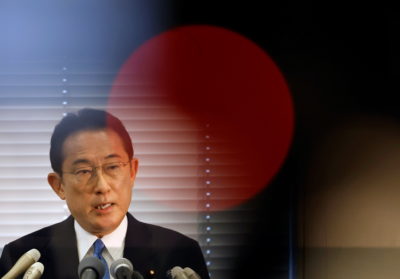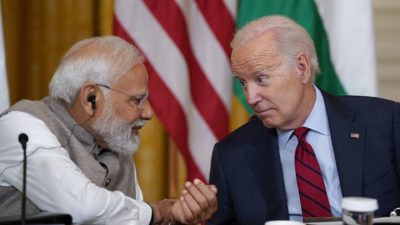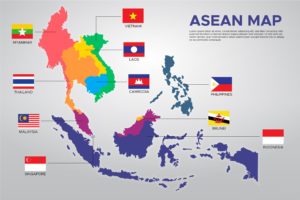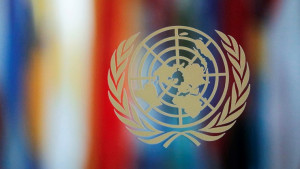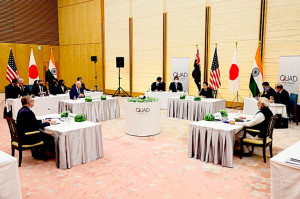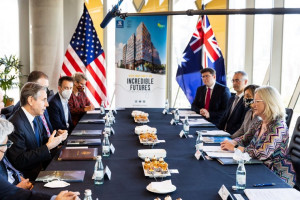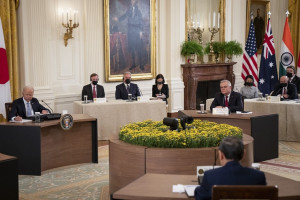Intensifying Japan's security co-operation with Asia-Pacific countries
Japan is currently facing a number of serious political and economic challenges, forcing the country’s political-military leadership to respond accordingly. On January 30, Prime Minister Fumio Kishida presented an extensive policy report on the Japanese government’s plans for 2024 at the regular session of the country’s parliament, which meets once a year. In the foreign policy section, Fumio Kishida outlined the following trunk lines…
How Washington is Internationalising Conflict in the Red Sea
Following the declaration of Yemen’s Houthis that they will attack any (cargo) ships travelling to Israel, the Red Sea region has become the latest flash point of yet another military conflict following the ones that are ongoing in Eastern Europe and the Middle East. In fact, Houthi attacks appear to be a direct outcome of Israel’s war on Palestine. Since the group is part of what is more commonly known as the “axis of resistance” against Israel and the US, most analysts in the mainstream Western media seem to simply associate the Houthi action with their bid to support Hamas against Israel…
India Jumps on Washington’s ‘China Containment’ Bandwagon
China’s fast-expanding global influence – especially, in the context of the Gaza war – has already emerged as a key issue for Washington. The US is already in a state of denial, and China’s rising global status is turning into too big an issue for New Delhi to handle without entering into a formal anti-China alliance being put together by the US. Therefore, there is an added incentive for New Delhi to reinforce its alliance with the US in an even more anti-China way. This was the major development out of the fifth annual US-India “2+2 dialogue” held on November 10, 2023, in India…
The Geopolitics of “AUKUS Plus”
In September 2021, the Australia, United Kingdom, and United States (AUKUS) deal brought nuclear technology for military use to the Indo-Pacific. The idea was to change the Indo-Pacific region in a way that would ultimately be ready to tackle – and scale back – China’s influence. The idea was to make Australia “sovereign ready”. Accordingly, the US and the UK are already in the middle of selling and building several nuclear submarines worth billions of dollars to Australia. While the US intends to sell at least 3 nuclear submarines by 2038, the UK and Australia are building a new SSN-AUKUS submarine that both fleets will operate. Australia is to receive Britain’s first SSN-AUKUS in the late 2030s and its first domestically built…
Are the comforting statements of QUAD and AUKUS founding States to be beli?
During the Shangri-La Dialogue security conference taking place in Singapore from June 2-4, US Secretary of Defense Lloyd Austin stated that the United States is not trying to form a new Western defense-oriented NATO-like bloc in the Asia-Pacific region. The Pentagon chief ascertained those present that the interests of European powers in the region are not only military-related, and therefore, of course, Europe “is present here” because it wants to guarantee the preservation of “good relations with the countries of the region.” Australian Deputy Prime Minister Richard Marles echoed his American…
Apparently, ASEAN is about to lose one of its most important elements, the Philippines
Cooperation of Philippines with the USA and its closest Asia-Pacific region allies is rapidly growing. And just as the international community barely got used to the March news about the number of bases in the Philippines which the USA has access to increasing to nine, as well as about the possibility of Japan and Australia fully joining the military cooperation with the Philippines, on May 31 the Japanese media reported that the defense ministers of Japan, the USA, Australia and the Philippines will hold four-party negotiations at the international forum on security…
Will Japan and India become permanent members of the UN Security Council?
On December 12, 2022 in London, during a meeting of the British Foreign, Commonwealth and Development Office, its head, James Cleverly, said that he was in favor of expanding the number of permanent members of the UN Security Council (UNSC) by including Japan, India, Brazil and Germany. The British diplomat believes...
The US alliance in the Indo-Pacific Stumbles
With India and China developing a new consensus on the management of their border in Ladakh and with the possibilities of bilateral conflict receding, the US-led anti-China alliance has begun to seriously stumble from within. With both Asian giants founding new common ground, the future of the QUAD looks...
Another Meeting of Quad Foreign Ministers
On February 11, Melbourne hosted the fourth meeting of foreign ministers of the countries participating in the Quad, which consists of the United States, Japan, India and Australia. Since the creation of this alliance in 2019, Washington (together with Tokyo and Canberra) attempted, firstly, to expand the scope of activity beyond the framework of an “interest club” (mainly humanitarian), and...
On the Second Summit of the Quad Participants
On September 24, the second summit of the Quad leaders, including Australia, India, Japan and the United States, was held in Washington. It is important to note that, unlike the first summit held six months earlier, the event at hand was a live face-to-face meeting. The NEO has been observing this project fairly regularly since it was updated (a year and a half ago) after fifteen years in a state...
On the Ministerial Meeting for Participants in the “Quad”
The meeting on October 6th between the foreign ministers for countries participating in the so-called "Quadrilateral" (the Quad), which is composed of the USA, Japan, India, and Australia, is one of the most noteworthy events on the world political stage in recent times. New Eastern Outlook has addressed the topic how the idea itself originated for the Quad (in the beginning...
